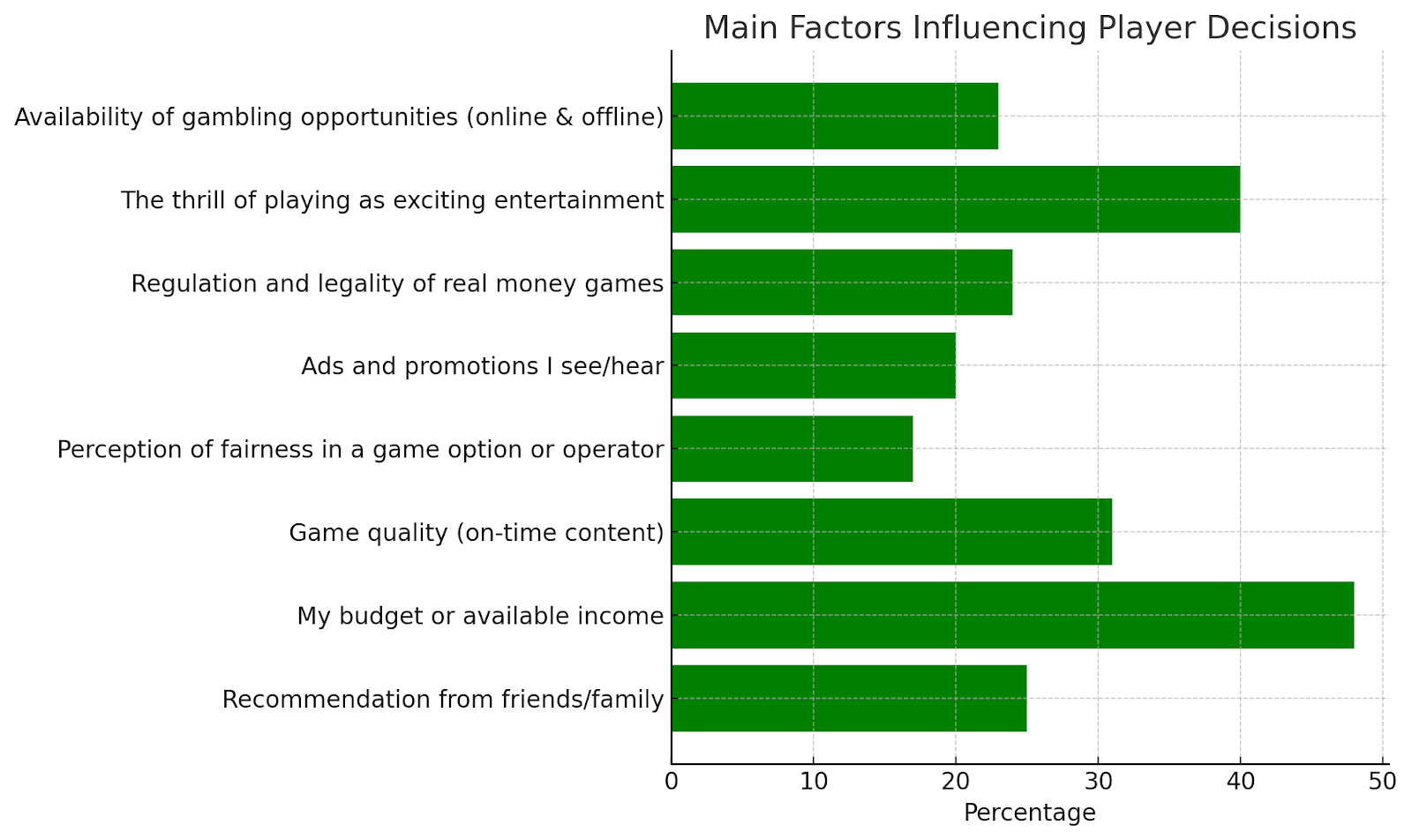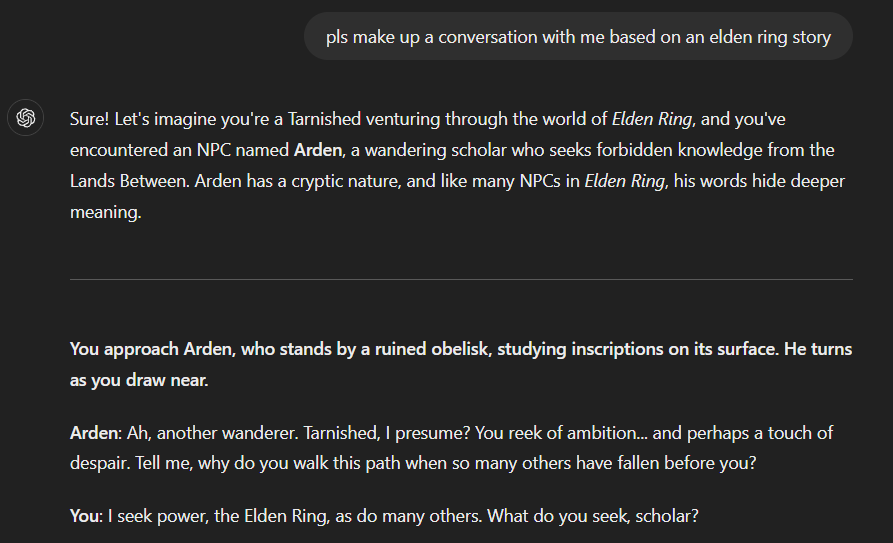Game development in 2024 is a field driven by passion and creativity, even though it can sometimes feel thankless. The iGaming industry is set to reach $107.3 billion by the end of the year. Additionally, the number of iGaming enthusiasts is expected to rise to 593 million in 2024, up from 454 million in 2017, which is an indicator of how new designs, gameplay, and the evolution of storytelling are appealing to users.
Developers pour their hearts into crafting unique gaming experiences that resonate with players, despite job insecurity and long work hours. Now, AI is revolutionizing this process by helping create more dynamic, interactive narratives.
With ChatGPT 4, developers can streamline the scriptwriting process (and even coding, in some cases), creating stories that adapt to player choices and preferences. Here's how you can use it to streamline your writing process and look like an experienced professional.
1. Generate plot ideas with AI
How long does it take to write a complex lore like Elden Ring's? How do you come up with the idea? Of course, this example is at a completely higher level, since it was revealed that George R.R. Martin, the renowned author of A Song of Ice and Fire, collaborated with Dark Souls' creator Hidetaka Miyazaki on the world building and lore shaping of the game, creating the history, mythos, and key figures in the universe. However, the main script was still written by Miyazaki.
Creating an original plot from scratch can be challenging, but AI tools can ignite creativity by generating unique storylines from basic prompts. Let's keep the Elden Ring game as an example.
It already has an established lore and storytelling style, so you can use a tool like ChatGPT to analyze the writing and suggest stories that align with its world. You can even interact with the AI using the tone of the characters, sparking your own ideas and helping you shape the narrative as you continue writing.
2. Bet on your audience
When crafting your script, it's useful to collect data from studies that analyze the target audience of the game by gender. AI tools can utilize this information to suggest plot twists that are in line with current gaming trends and player preferences. Insights on how players bet at KTO can offer valuable information for casino game developers about player behaviors and preferences, as illustrated in the graph below. Similarly, video game developers can employ detailed user engagement data to shape their game design and storylines, ensuring they align with their audience's evolving preferences.
A recent study by KTO revealed that 40% of players are drawn to iGaming for the thrill and excitement of the bet, underscoring the industry's focus on entertainment. Meanwhile, 31% are attracted by the high quality of online games, highlighting the critical role that User Interface, game design, and User Experience play in retaining players. Additionally, 25% of players are influenced by recommendations from friends or peers, demonstrating the strong impact that social circles have on gaming behavior and decisions within the community.
3. Building worlds and characters with ChatGPT
AI can help you create richly detailed worlds and deep character profiles. Whether you're developing a casino game set in a glamorous virtual world or a fantasy RPG, AI tools can assist in crafting intricate lore and backstories.
For example, many Elden Ring players enjoy uncovering hidden lore and piecing together fragmented stories. AI could generate NPCs that respond to this behavior by providing cryptic hints or lore fragments that reward exploration.
An NPC like Patches, a recurring trickster character in FromSoftware games, could use AI to adapt his behavior based on the player's tendencies. If the AI detects that a player tends to spare enemies or be more merciful, Patches might mock the player for being too soft, or he might offer different dialogue options, trying to manipulate the player into further betrayal. On the other hand, if a player consistently engages in aggressive or ruthless actions, Patches might adopt a more cautious tone, reflecting a more fearful or respectful stance.
3. Dynamic dialogues for interactive experiences
One of AI's greatest strengths in game development is its ability to generate real-time, dynamic dialogue. Instead of writing static lines for NPCs, AI can create responsive conversations based on player choices. This is particularly useful in games where players' decisions significantly impact the storyline, such as RPGs or narrative-driven casino games.
In this example, I had already presented some background information and asked ChatGPT to create a dialogue with me:
The tone and choice of words for the dialogue are the exact same as those you can find throughout the gameplay, showing the efficiency of the tool.
4. Testing and refining the script
Once the script is written, AI can assist in testing and refining it by simulating different narrative paths. This ensures that every possible player decision is accounted for and that the story remains cohesive. Additionally, AI can analyze player feedback during beta tests, refining the script to make it more engaging based on real-world player behavior.
This process can be particularly useful when developing a game that requires careful balancing of narrative and gameplay, such as in esports betting simulations or story-driven casino games. AI can simulate thousands of player interactions to ensure that every outcome is satisfying and that there are no narrative dead ends.
Game development is a labor of love, as evident from the dedication many developers show, despite the challenges in the industry. AI provides a valuable tool that enhances this creative process, allowing developers to focus on the heart of their game while the technology handles procedural storytelling, dynamic dialogues, and plot generation.
That said, it's essential to remember that no tool can fully replace the human touch. While AI is impressive and can store details about your work, making adjustments easier, you still need to refine the output and review each line carefully. Ensuring that the dialogue and word choices align with the story you want to tell is essential. AI can streamline the process, but it can also become repetitive, using jargon you might prefer to avoid.
Whether it's crafting rich backstories or generating real-time reactions to player behavior, AI allows developers to create more engaging, immersive experiences. By combining human creativity with AI's efficiency, creating your next story can be easier than you imagine.

